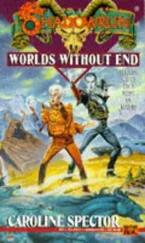What could she do? She knew Ralph was drawn to her sexually. She had used that knowledge, in desperation, to get in to see him at the sheriff’s castle. Their encounter at the Bell all those years ago, a vile memory to her, had lived in his recollection as a golden moment, probably much enhanced by the passage of time. And she had put into his head the idea of reliving that moment.
This was her own fault.
Could she somehow disabuse him? “We aren’t the same people we were all those years ago,” she said. “I will never be an innocent young girl again. You should go back to your serving wenches.”
“I don’t want serving girls, I want you.”
“No,” she said. “Please.” She fought back tears.
He was implacable. “Take off your dress.”
She sheathed her knife and unbuckled her belt.
The moment Merthin woke up, he thought of Lolla.
She had been missing now for three months. He had sent messages to the city authorities in Gloucester, Monmouth, Shaftesbury, Exeter, Winchester and Salisbury. Letters from him, as alderman of one of the great cities of the land, were treated seriously, and he had received careful replies to them all. Only the mayor of London had been unhelpful, saying in effect that half the girls in the city had run away from their fathers, and it was no business of the mayor’s to send them home.
Merthin had made personal inquiries in Shiring, Bristol and Melcombe. He had spoken to the landlord of every tavern, giving them a description of Lolla. They had all seen plenty of dark-haired young women, often in the company of handsome rogues called Jake, or Jack, or Jock; but none could say for sure that they had seen Merthin’s daughter, or heard the name Lolla.
Some of Jake’s friends had also vanished, along with a girlfriend or two, the other missing women all some years older than Lolla.
Lolla might be dead – Merthin knew that – but he refused to give up hope. It was unlikely she had caught the plague. The new outbreak was ravaging towns and villages, and taking away most of the children under ten. But survivors of the first wave, such as Lolla and himself, must have been people who for some reason had the strength to resist the illness, or – in a very few cases, such as his own – to recover from it; and they were not falling sick this time. However, the plague was only one of the hazards to a sixteen-year-old girl running away from home, and Merthin’s fertile imagination tortured him, in the small hours of the night, with thoughts of what might have happened to her.
One town not ravaged by the plague was Kingsbridge. The illness had affected about one house in a hundred in the old town, as far as Merthin could tell from the conversations he held, shouted across the city gate, with Madge Webber, who was acting as alderman inside the city walls while Merthin managed affairs outside. The Kingsbridge suburbs, and other towns, were seeing something like one in five afflicted. But had Caris’s methods overcome the plague, or merely delayed it? Would the illness persist, and eventually overcome the barriers she had put up? Would the devastation be as bad as last time in the end? They would not know until the outbreak had run its course – which might be months or years.
He sighed and got up out of his lonely bed. He had not seen Caris since the city was closed. She was living at the hospital, a few yards from Merthin’s house, but she could not leave the building. People could go in but not come out. Caris had decided she would have no credibility unless she worked side by side with her nuns, so she was stuck.
Merthin had spent half his life separated from her, it seemed. But it did not get any easier. In fact he ached for her more now, in middle age, than he had as a youngster.
His housekeeper, Em, was up before him, and he found her in the kitchen, skinning rabbits. He ate a piece of bread and drank some weak beer, then went outside.
The main road across the island was already crowded with peasants and their carts bringing supplies. Merthin and a team of helpers spoke to each of them. Those bringing standard products with agreed prices were the simplest: Merthin sent them across the inner bridge to deposit their goods at the locked door of the gatehouse, then paid them when they came back empty. With those bringing seasonal produce such as fruits and vegetables he negotiated a price before allowing them to deliver. For some special consignments, a deal had been made days earlier, when he placed the order: hides for the leather trade; stones for the masons, who had recommenced building the spire under Bishop Henri’s orders; silver for the jewellers; iron, steel, hemp and timber for the city’s manufacturers, who had to continue working even though they were temporarily cut off from most of their customers. Finally there were the one-off cargoes, for which Merthin would need to take instructions from someone in the city. Today brought a vendor of Italian brocade who wanted to sell it to one of the city’s tailors; a year-old ox for the slaughterhouse; and Davey from Wigleigh.
Merthin listened to Davey’s story with amazement and pleasure. He admired the lad for his enterprise in buying madder seeds and cultivating them to produce the costly dye. He was not surprised to learn that Ralph had tried to scuttle the project: Ralph was like most noblemen in his contempt for anything connected with manufacture or trade. But Davey had nerve as well as brains, and he had persisted. He had even paid a miller to grind the dried roots into powder.
“When the miller washed the grindstone afterwards, his dog drank some of the water that ran off,” Davey told Merthin. “The dog pissed red for a week, so we know the dye works!”
Now he was here with a handcart loaded with old four-gallon flour sacks full of what he believed to be precious madder dye.
Merthin told him to pick up one of the sacks and bring it to the gate. When they got there, he called out to the sentry on the other side. The man climbed to the battlements and looked down. “This sack is for Madge Webber,” Merthin shouted up. “Make sure she gets it personally, would you, sentry?”
“Very good, alderman,” said the sentry.
As always, a few plague victims from the villages were brought to the island by their relatives. Most people now knew there was no cure for the plague and simply let their loved ones die, but a few were ignorant or optimistic enough to hope that Caris could work a miracle. The sick were left outside the hospital doors, like supplies at the city gate. The nuns came out for them at night when the relatives had gone. Now and again a lucky survivor emerged in good health, but most patients went out through the back door and were buried in a new graveyard on the far side of the hospital building.
At midday Merthin invited Davey to dinner. Over rabbit pie and new peas, Davey confessed he was in love with the daughter of his mother’s old enemy. “I don’t know why Ma hates Annet, but it’s all so long in the past, and it’s nothing to do with me or Amabel,” he said, with the indignation of youth against the irrationality of parents. When Merthin nodded sympathetically, Davey asked: “Did your parents stand in your way like this?”
Merthin thought for a moment. “Yes,” he said. “I wanted to be a squire and spend my life as a knight fighting for the king. I was heartbroken when they apprenticed me to a carpenter. However, in my case it worked out quite well.”
Davey was not pleased by this anecdote.
In the afternoon access to the inner bridge was closed off at the island end, and the gates of the city were opened. Teams of porters came out and picked up everything that had been left, and carried the supplies to their destinations in the city.
Читать дальше












